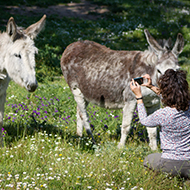Re-introduction of extinct bee is a success
A species of bumblebee that was driven to extinction in the UK has nested for the first time in 25 years.
The short-haired bumblebee started dying out in the 1980s and was officially declared extinct in 2000 after wildflower-rich grasslands disappeared.
After two releases of queen bees, offspring worker bees have been recorded for the first time.
A re-introduction project was launched at the Royal Society for the Protection of Birds (RSPB) Dungeness reserve in Kent.
Local farmers sowed wildflowers in order to create the ideal habitat for the bees. Project leader Dr Nikki Gammans travelled to Sweden with a team of volunteers to collect queen bees for a pilot introduction.
The bees struggled with the cold and wet summer of last year but the second introduction in June this year has seen the population growing. Further releases are planned as the project continues to build up the population.
Dr Gammans said: “This is a milestone for the project and a real victory conservation. We now have proof that this bumblebee has nested and hatched young and we hope it is on the way to becoming a self supporting wild species in the UK once again.”
“It’s been a long journey to get here, from creating the right habitat for them, collecting queens in the Swedish countryside, scanning them for diseases and then eventually releasing them at Dungeness. Seeing worker bees for the first time is a fantastic reward for all that hard work, but we still have a way to go to ensure this population is safe and viable.”
The project, which has been backed by Natural England, RSPB, Bumblebee Conservation Trust and Hymettus has also resulted in increased sightings of other rare bumblebee species this summer.
Image courtesy of James Lindsey at Ecology of Commanster






 RCVS Knowledge has called on vet practices to audit their post-operative neutering outcomes.
RCVS Knowledge has called on vet practices to audit their post-operative neutering outcomes.
